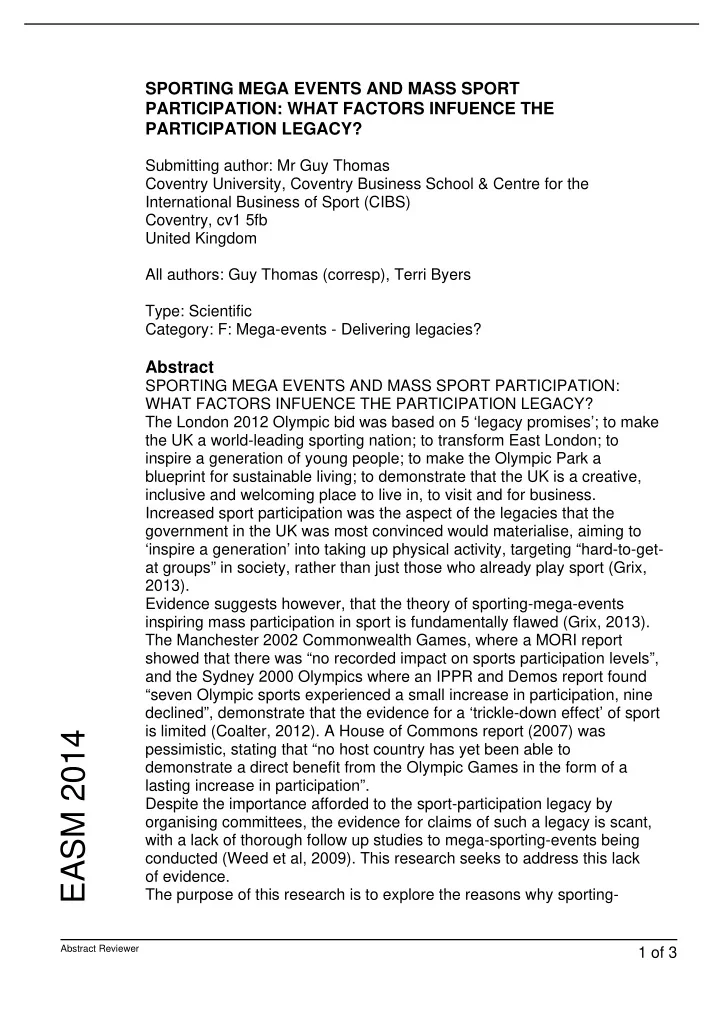

SPORTING MEGA EVENTS AND MASS SPORT PARTICIPATION: WHAT FACTORS INFUENCE THE PARTICIPATION LEGACY? Submitting author: Mr Guy Thomas Coventry University, Coventry Business School & Centre for the International Business of Sport (CIBS) Coventry, cv1 5fb United Kingdom All authors: Guy Thomas (corresp), Terri Byers Type: Scientific Category: F: Mega-events - Delivering legacies? Abstract SPORTING MEGA EVENTS AND MASS SPORT PARTICIPATION: WHAT FACTORS INFUENCE THE PARTICIPATION LEGACY?� The London 2012 Olympic bid was based on 5 ‘legacy promises’; to make the UK a world-leading sporting nation; to transform East London; to inspire a generation of young people; to make the Olympic Park a blueprint for sustainable living; to demonstrate that the UK is a creative, inclusive and welcoming place to live in, to visit and for business.� Increased sport participation was the aspect of the legacies that the government in the UK was most convinced would materialise, aiming to ‘inspire a generation’ into taking up physical activity, targeting “hard-to-get- at groups” in society, rather than just those who already play sport (Grix, 2013).� Evidence suggests however, that the theory of sporting-mega-events inspiring mass participation in sport is fundamentally flawed (Grix, 2013). The Manchester 2002 Commonwealth Games, where a MORI report showed that there was “no recorded impact on sports participation levels”, and the Sydney 2000 Olympics where an IPPR and Demos report found “seven Olympic sports experienced a small increase in participation, nine declined”, demonstrate that the evidence for a ‘trickle-down effect’ of sport is limited (Coalter, 2012). A House of Commons report (2007) was EASM 2014 pessimistic, stating that “no host country has yet been able to demonstrate a direct benefit from the Olympic Games in the form of a lasting increase in participation”.� Despite the importance afforded to the sport-participation legacy by organising committees, the evidence for claims of such a legacy is scant, with a lack of thorough follow up studies to mega-sporting-events being conducted (Weed et al, 2009). This research seeks to address this lack of evidence.� The purpose of this research is to explore the reasons why sporting- Abstract Reviewer 1 of 3
mega-events fail to live up to expectations in stimulating participation in sport (Jago et al, 2010). This research is constructing comparative case- studies of 4 sporting-mega-event hosts: Atlanta 1996 Olympics, South Africa 2010 World Cup, London 2012 Olympics and Brazil 2014 World Cup. We do this through analysing voluntary sport-clubs perceptions and experiences of the legacies, and the associated policies which have sought to raise participation. � Voluntary sport-clubs are the ideal conduit for the provision of grassroots sport, with local and national authorities making them a focus of a number of initiatives and a great deal of funding, such as the Places People Play initiative around London 2012 (Grix, 2013). This research allows us to analyse the constraining and enabling forces acting upon sports clubs, and their ability to be a part of an effort to raise participation in sport, ultimately offering policy suggestions for good practice in the future to more effectively raise participation.� THEORETICAL BACKGROUND� This paper builds upon research which has called into question the ability of sporting-mega-events to effectively deliver the anticipated legacies (See Coalter, 2012; Jago et al, 2010). This is reinforced by literature which has challenged the effectiveness of the ‘demonstration effect’, the ability of elite sport to inspire average non-participants in sport to take part in the recommended amount of sport and exercise (See Grix, 2013; Weed et al, 2009). This research goes further, analysing the reasons why the demonstration effect has not been able to enact a legacy of increased sport participation.� METHODOLOGY� This study uses semi-structured interviews with participants who are involved in the running of voluntary sport-clubs in areas affected by mega-sporting-events. These seek evidence of the effects of the legacy, such as increased participation in sport, analysing the reasons why effects have or have not been felt. � Clubs are targeted due to their proximity to the mega-events, targeting clubs which are within the federal state or provincial governing area of the host cities of the mega-events. Sports which are represented at the mega-events are particularly targeted. Participants are targeted on the basis that they are part of the organisation of the club, sitting upon the committee with knowledge of the operations of the club throughout the mega-event and beyond.� EASM 2014 RESULTS AND DISCUSSION� This paper reports the preliminary interviews from Atlanta, USA, and the analysis of those interviews. � While research has identified that mega-sporting-events have difficulty in meeting expectations of raising participation, the reasons why this is the case have not been thoroughly considered (See Jago et al, 2010; Weed et al, 2009; Grix, 2013). The results of this study will detail the reasons why sport clubs have not been able to meet government objectives of raising participation, and offer practical policy suggestions to combat such problems and improve the rate of participation in the future. Abstract Reviewer 2 of 3
References REFERENCES� Coalter, F., (2012), Stuck in the Blocks? A sustainable sporting legacy, in After the Gold Rush A sustainable Olympics for London, ed by Vigor, A., Mean, M., Tims, C., London, IPPR and Demos, pp91-108.� Grix, J., (2013), Sport Politics and the Olympics, Political Studies Review, Vol 11, Issue 1, pp15-25.� House of Commons Culture, Media and Sport Committee, (2007), London 2012 Olympic Games and Paralympic Games : Funding and Legacy, London, The Stationary Office Limited.� Jago, L., Dwyer, L., Lipman, G., Lill, D., Vorster, S., (2010), Optimising the Potential of Mega-events: An Overview, International Journal of Event and Festival Management, Vol 1, Issue 3, pp220-237.� Weed et al, (2009), A Systematic Review of the Evidence Base for Developing a Physical Activity and Health Legacy from the London 2012 Olympic and Paralympic Games, SPEAR, Canterbury Christ Church University. EASM 2014 Abstract Reviewer 3 of 3
Recommend
More recommend